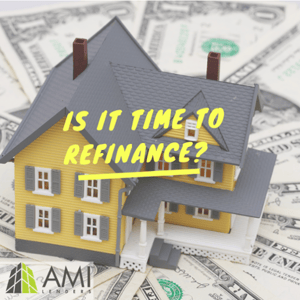 When you hear the term “refinance” you may ask yourself what this means. In simple terms to refinance means to finance again, typically with a new loan at a lower rate, term or interest. A homeowner has access to a new loan which replaces the exiting loan, or in some cases, the homeowner may own the property “free and clear” so a refinance will allow them to tap into the home’s equity.
When you hear the term “refinance” you may ask yourself what this means. In simple terms to refinance means to finance again, typically with a new loan at a lower rate, term or interest. A homeowner has access to a new loan which replaces the exiting loan, or in some cases, the homeowner may own the property “free and clear” so a refinance will allow them to tap into the home’s equity.
The various types of refinancing include:
- Rate-and-term refinance
- Cash-out refinance
- Cash-in refinance
Through residential hard money loans, Homeowners can customize the new mortgage loan based on their needs, some of these include:
- Reducing the monthly payment
- Reducing the loan length in years
- Reducing the interest rate
- Paying off debt
- Gaining access to cash for home improvements
- Cancel mortgage insurance premiums
Home Investor Loans are tied and secured by real estate. You obtain a mortgage when you (the debtor) convey a real property to a creditor as security on a loan. You sign a legal agreement at closing by which the creditor lends money at an interest in exchange for placing a lien on the debtor’s property, with the condition that the lien on the title is to be released upon the payment of the debt.
You can customize the type of mortgage you have based on your needs. If you are unhappy with the current rate or terms, and banks don’t seem like a viable financing option for you, as private money lenders in Texas we can help you.
Refinances are popular when rates drop, but they are also a way to re-tune your finances.
First, you should consider the following factors when pondering whether to refinance.
- What is my property’s current appraised value?
- How much do I owe my existing lender?
- What can go wrong with a home refinance?
- Is refinancing worth it for me?
Below, we will explore a couple of scenarios for each of the various types of refinancing methods, in cases it may be smart to move forward with a home investor loan whereas in other types of scenarios not so much. We’ve provided residential hard money loans in the area for many years and we know it can get tricky.
Bob and Jenna purchased their first home for $100,000.00 in the summer of 1999 and put a hefty down payment of $20,000.00 their home loan balance is $35,000.00 and the property is now worth $250,000.00. Bob and Jenna would be the perfect candidate for a “cash-out” refinance because they have sufficient equity in their home. They could use a cash-out if they wanted to backstop a business against cash flow emergencies, buy a second home, buy an investment property, add or protect their existing investments, pay-off credit card debt or can opt for a home-improvement loan instead.
This could seem like a very smart investment if they can afford to increase their loan balance, pay a higher rate (typically cash-out refinance rates) are higher than rate and term refinances and increase their loan term. All of which you can do through a private money lender.
A rate-and-term refinance is when you don’t walk away from closing with any cash whatsoever and you roll it all into a new loan.
James and Kathy have a home with a value of $150,000.00, and they owe $110,000.00 to their existing lender. They are paying a high rate because at the time of the purchase their credit wasn’t so great. Rates have fallen below 5%, and they wish to take advantage of lower rates. James and Kathy would apply for a rate and term refinance where their loan balance will increase to $120,000.00 ($110,000.00 to pay their current lender, and $10,000.00 in approx. closing costs) to change their term from a 30-year fixed rate to a 15-year fixed rate. Although their loan balance is increasing and the payment is increasing slightly, they will pay-off the loan in half the amount of time and save interest in the long run.
This only makes sense if the total amount of interest over the life of the loan is reduced, if they would refinance into another 30 year mortgage and lower the rate only by a .25% or .50% and add in $10,000.00 in closing costs; it would not be such a smart move overall, as the total interest would increase. We consider it our duty, as private money lenders, to alert our clients of such risks.
Now, a cash-in refinance may seem a bit odd to most people. Why would anyone want to “pay to close” on their refinance? This happens when the amount you owe to your lender exceeds the amount of the loan that you are approved to borrow. Typically, this happens when the value of your home has dropped (or another popular term is when you are “underwater”), and you need to pay the difference at closing in order to get the new loan.
Jack and Jill obtained a mortgage popular in the “subprime lending era” called a “pick a pay” this type of mortgage is an “adjustable rate mortgage” where they can choose from multiple payment plan options: interest-only payments, regular payment (15 yr or 30 yr payment) or the minimum payment. This is an excellent option for those who anticipate income increases over the next few years and don’t plan as on keeping the home as a long-term investment. Unfortunately, they chose to make the minimum payment, which falls short of covering their total interest payments. They initially obtained a mortgage for $120,000.00 now their loan balance has increased to $160,000.00, and the value is $180,000.00. Their new mortgage is approved for $144,000.00 will have a fixed rate where the payment includes a payment to principal and interest. Although their payment will double, they will eventually be paying down the mortgage quicker. They would eventually have to pay $16,000.00 to pay the difference of their current loan balance and approved loan amount plus closing costs. In the end, they would pay to close but would be in a much better position after the refinance is complete.
Deciding if refinancing is best for you is a personal decision. Whether you are looking for a hard money mortgage lender, a private money lender in Houston, or just need some mortgage investment advice, call one of our licensed loan originators today; we have a combined 60 years’ experience in lending money to individuals like you. We can help you choose an option that fits your needs. The number is is 713-682-4400 or click here to view our lending terms or apply online for a Hard Money Loan that fits your needs in Texas.




